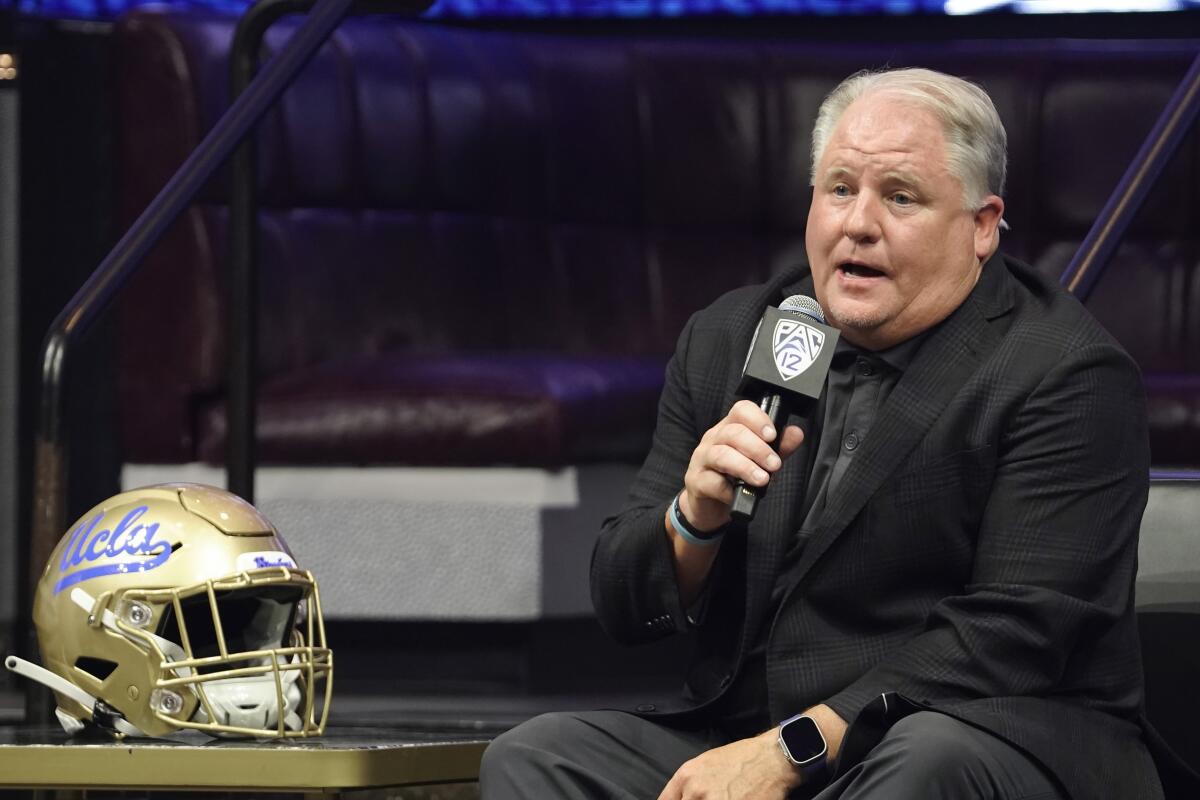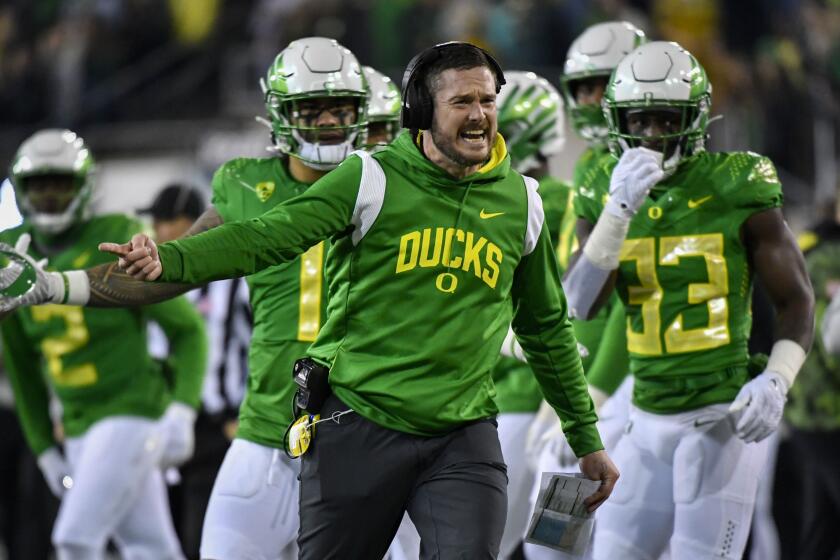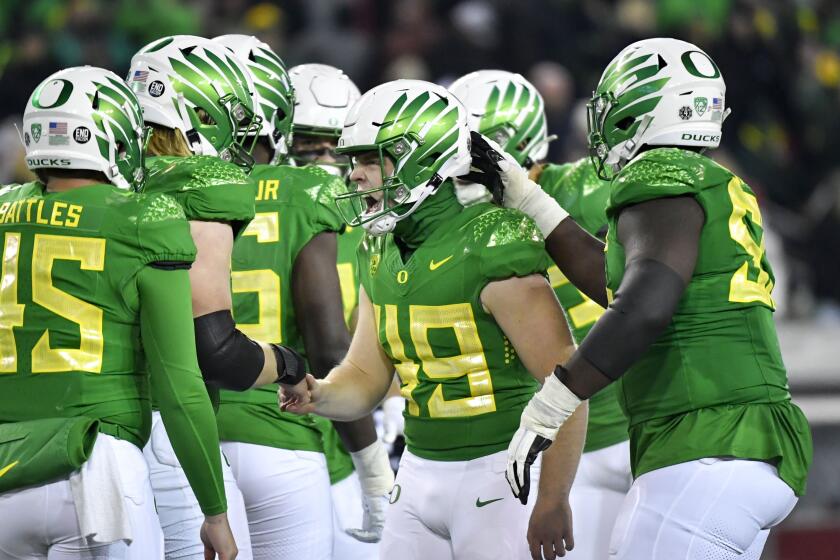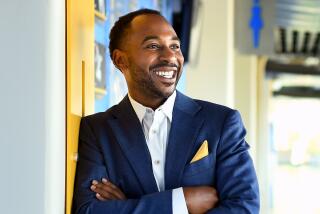Tired of nonstop realignment? UCLA’s Chip Kelly may have the common-sense solution

- Share via
Chip Kelly has a solution for all the crazy cross-country travel, not to mention the century’s worth of rivalries and tradition torn asunder by ceaseless realignment in college football.
Are you ready for a dose of common sense?
One conference. Every team. Divisions are aligned by geography.
“Do it like the NFL, where there’s NFC West, NFC North, NFC South where it’s the same thing and then we all get together,” Kelly, who coached for four seasons in the NFL before coming to UCLA, said Friday morning. “But I think there should be one conference in all of college football and just break it up like they do in the professional ranks. … That makes the most sense. There’s your travel question, there’s all those other questions.”
The Pac-12 faces a bleak future as Oregon and Washington jump to the Big Ten, pushing the Pac-12 toward a collapse or merger in diminished form.
Traditionalists can only daydream about such simplicity, especially after Oregon and Washington were cleared to join UCLA and USC in the Big Ten Conference in 2024.
The departure of the Ducks and Huskies could spell the end of the Pac-12 since further defections are almost assured. Meanwhile, Florida State officials have publicly stated they’re looking to bolt the Atlantic Coast Conference in hopes of a more lucrative future, even reportedly engaging private equity firms as potential investment partners.
At least UCLA knows where it’s headed thanks to its switch to the Big Ten, which now stands at 18 teams for the moment. Kelly praised UCLA Chancellor Gene Block, who earlier this week announced he was leaving his post after 17 years, for having the foresight to approve a conference move shepherded by athletic director Martin Jarmond.
“When you look at the landscape of where we are now,” Kelly said, “you give [Block] great credit for being able to stay ahead when other people are scrambling to find spots now and the fact that we know where we’re going to be in 2024 and beyond, he deserves a ton of credit for that.”
The additions of Oregon and Washington could alleviate some travel concerns for UCLA and USC while preserving those rivalries, though the Trojans and Bruins were not believed to be in favor of the Ducks accompanying them to the Big Ten.
USC wants to establish itself as the West Coast power again in the Big Ten, but Oregon could make it difficult if it’s invited to join.
Based on his studies of sleep and performance related to travel when he coached in the NFL, Kelly said he didn’t anticipate many adjustments with the Bruins traveling to the Midwest and the East Coast to play in the Big Ten.
“If you’re only there for less than 36 hours, there is no jetlag,” Kelly said, alluding to his experiences. “You stay on your body clock. What we did when we were in San Francisco and we had to go play Carolina, it’s just a 10 a.m. start for us, but we were on the field for practice at 10 a.m., so it really wasn’t that much different.
“When we go to play an East Coast team in the Big Ten a year from now, they’ve told us we won’t play any games before 12:30 p.m. our time, so that would be a 3:30 kick for them, so we’ll stay on our same time schedule because we would leave on Friday, play a game — which would be noon for us, 3 for them — on Saturday and then get on a plane and come back, so it doesn’t affect you from that standpoint because you’re only there for a short time, so you really try to stay on the same schedule that you’ve been on for the whole time.”
Kelly said he spent little time pondering realignment, in part, because he has no say in the matter and no one asks his opinion. His proposed solution suggested he had given the topic some thought, though there were obviously some possible sticking points. Why would a powerhouse like Alabama be willing to subsidize the weaker teams in a massive conference?
“That’s a great question,” Kelly said. “That’s why I don’t think about it very much.”
Unexpected expense
Kyle Ford’s crosstown move was more complicated than it might sound.
Locked into a lease at his apartment near USC, the UCLA wide receiver forked over two rents for his first several months as a Bruin after finding another place closer to his new school. The lease on his old place finally expired last month, giving his bank account a boost. It also provided a new mantra for future leases.
“Sign those six months,” Ford said with a smile.
Ford appears locked into being a significant part of the Bruins’ receiver rotation alongside J. Michael Sturdivant, another newcomer who transferred from California. The similarities between them might end there.
“He’s more of a fast guy and he’s got certain movements that I like to see him do,” Ford said, “and I’m more, I feel like, a physical guy and I can get open in different ways. So we’ve been able to bounce each other’s game off each other and add certain things to our toolbox, which has been nice.”
Ford’s repertoire appears to include a heavy dose of jawing with defensive backs that he unveiled in the spring, though he said he made sure that came only after he showed his willingness to work hard and be a good teammate.
“No one wants someone to come up in here, new transfer guy, and just start talking, talking, talking,” Ford said. “I feel like I’ve kind of earned a lot of respect from my teammates, which I’m really thankful for.”
Etc.
Kelly said linebacker Ale Kaho, running back Deshun Murrell and offensive lineman Siale Taupaki, who have not appeared in individual drills during the first three days of training camp, were working their way back from injuries. Linebacker JonJon Vaughns, who has been similarly limited, was working his way into football shape after making the transition from baseball season, Kelly said. “Football shape and baseball shape,” Kelly said, “are two different things.”
More to Read
Go beyond the scoreboard
Get the latest on L.A.'s teams in the daily Sports Report newsletter.
You may occasionally receive promotional content from the Los Angeles Times.









